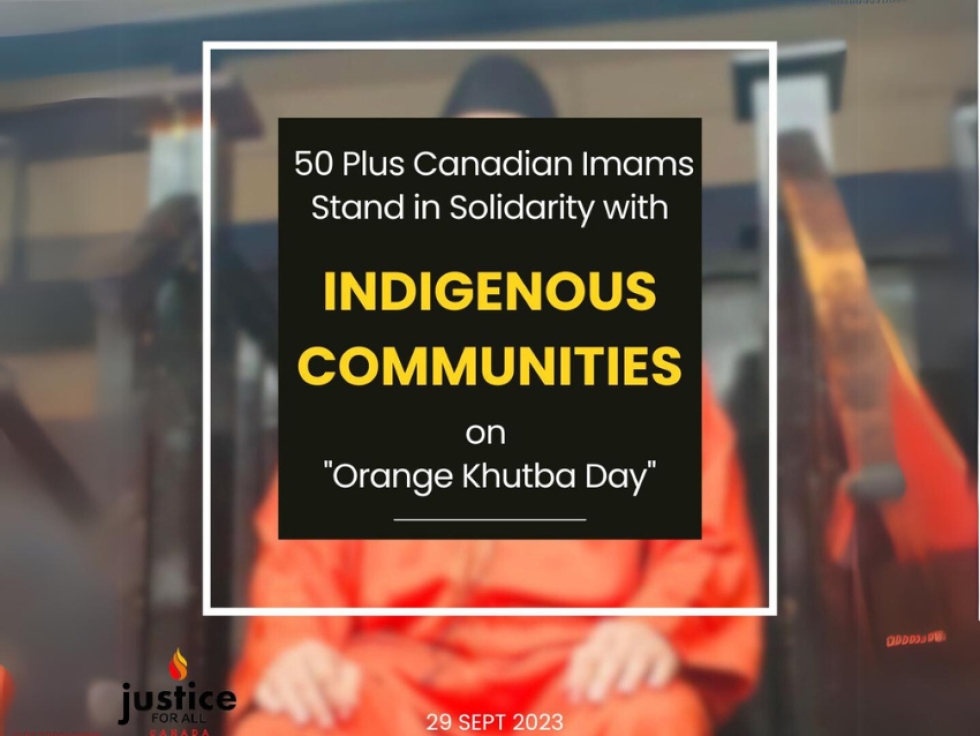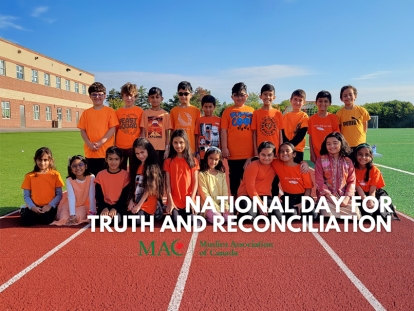
Oct
50 Plus Canadian Imams Stand in Solidarity with Indigenous Communities on "Orange Khutba Day" - Commemorating the National Day of Truth and Reconciliation
Written by Justice for All CanadaIn a powerful demonstration of unity and reconciliation, over 50 Canadian Imams participated in "Orange Khutba Day" on Friday, September 29, 2023, coinciding with the National Day of Truth and Reconciliation.
This initiative signifies fostering solidarity between Muslims and Indigenous communities while honouring the memory of residential school victims and survivors in Canada.
The 2023 "Orange Khutba Day" campaign saw Canadian Imams nationwide deliver a special solidarity statement during their Friday Jumu'ah prayer congregations at mosques (khutba).* This sermon conveys support and empathy for Indigenous communities, former residential school students, and the families who have endured the heartbreak of lost children.
This call to action, initiated by Justice For All Canada, reflects the commitment of over 50 Canadian Muslim religious congregations to stand together with Indigenous peoples in their time of immense trauma and grief. The initiative has evolved to focus on practicing and reaffirming the shared responsibility of reconciliation and allyship with Indigenous peoples.
“Today, we come together as Muslims to build bridges of understanding, compassion and healing. The challenges experienced by our Indigenous neighbours serve as a critical reminder of the importance of justice and equality for others,” said Taha Ghayyur, Executive Director of Justice For All Canada.
In addition to expressing solidarity, "Orange Khutba Day" will serve as a vital moment for settler immigrant Muslim communities to raise awareness about the historic and ongoing atrocities and discrimination faced by First Nations, Metis and Inuits in Canada. The campaign asks Muslim worshipers to reflect on the long-lasting effects of colonialism and forced assimilation—shared experiences that resonate with many impacted communities worldwide.
This year's "Orange Khutba Day" represents another pivotal moment in Canadian history for Muslims and their neighbours alike, where diverse faith communities unite to acknowledge past injustices, support reconciliation efforts, and collectively strive for equality and recognition of Indigenous peoples.
*A "khutba" is a sermon or religious speech delivered by an Imam or religious leader, typically during the Friday congregational prayer (Jumah) in Islam. It serves as an opportunity for an Imam to address the Muslim community, provide guidance, and deliver religious teachings.
For the complete solidarity statement presented by Canadian Imams, see below:
O you who have believed, be persistently standing firm in justice, witnesses for Allah , even if it be against yourselves or parents and relatives. (4:135)
Every year on September 30th, Orange Shirt Day is commemorated as an opportunity to discuss the effects of residential schools and their legacy that destroyed the lives and spirits of thousands of Indigenous children and their families. It honours the experiences of Indigenous Peoples, celebrates resilience and affirms a commitment that every child matters.
Today, across Canada over a hundred Imams and Masjids are taking part in the National Khutbah Day organized by Justice for All Canada to highlight the Canadian Muslim responsibility toward the ongoing injustices faced by the original owners and hosts of this lands, i.e.the First Nation, the Metis, and Inuit communities of Canada.
According to the 2021 Census, there are 1.8 million Indigenous people, accounting for 5.0% of the total population in Canada, slightly more than the Muslim population.
What is Orange Shirt Day?
- Orange Shirt Day reminds us of a real orange shirt that was forcibly taken from a residential school survivor at the age of 6 years old by her teacher as part of the school's plan to strip all Indigenous children of their heritage and culture.
- More than 150,000 children from First Nations, Métis and Inuit communities across Canada were taken away from their parents and enrolled in “Indian residential schools” between the late 1800s and 1996.
- 140 residential schools operated between 1867 and 1996.
- These schools were operated by the Canadian government and church organizations and were part of Canada’s official policy that aimed to eliminate Indigenous Peoples’ languages and cultures and, through genocide and assimilation, cause them to cease to exist as distinct peoples.
- Students at these schools were subjected to physical and sexual abuse, and died of diseases because of poor sanitary conditions and lack of health screening.
- It is estimated that between 4,000-6,000 children died at residential schools.
- Since June 2021, hundreds of unmarked graves have been discovered at or around the former residential school sites as part of Canada government’s investigation into these unspeakable crimes covered over for decades by the government agencies and churches across Canada.
What is Our Responsibility to Indigenous Peoples?
1. Responsibility to Acknowledge Our Privilege
As immigrant settlers, we must recognize our privilege to be living in a free, prosperous, and
democratic society.
However, these blessings come at an immense cost to the people whose lands are being stolen, treaties are being broken, cultures are erased, children are uprooted from families, and health and economic wellbeing is ignored by the colonial powers. This is the beginning of dismantling privilege and understanding your place in the colonial structure.
2. Responsibility to Acknowledge Our Hosts
- Islamic duty to acknowledge, honour, and thank hosts of the land
- Prophet Muhammad, peace be upon him, was sensitive to the culture and norms of people of Madina after migrating there as a refugee
- Traditionally, Muslims acknowledged and honoured the traditions and leaders of the lands wherever they went
- As settlers in Canada we have a responsibility to understand and raise awareness about the erasure of the history and cultures of our hosts by the colonial system
3. Responsibility to Act as a Steward: Khalifah
Allah has created us as a Khalifah (Caliph) or Steward on earth (Quran 7:69), which means we are supposed to be:
- Stewards of the earth
- Caretakers of ecosystems and environment
- Defenders of peace and justice
- Advocates of the poor and marginalized
Indigenous Peoples have been taking care of this land for centuries as a sacred duty. We need to work with them on this common value as Kahlifas of Allah on this earth.
4. Responsibility to Follow Prophetic Mission: Establishing Qist
Indeed We sent Our Messengers with Clear Signs, and sent down with them the Book and the Balance that people may uphold justice (Qist)... (Al-Hadeed 57:25). Standing up for Justice (Qist) was a mission common to ALL prophets of God. It is our religious responsibility to stand with Indigenous Peoples in their fight for justice, truth and reconciliation.
5. Responsibility to Change Evil Condition
Abu Said Al-Khudri reported that the Prophet, peace be upon him, said: "Whosoever of you sees an evil, let him change it with his hand; and if he is not able to do so, then
[let him change it] with his tongue; and if he is not able to do so, then with his heart — and that is the weakest of faith.” (Muslim #49)
6. Responsibility to Repel Darkness: Zulm
Ibn Umar reported that the Prophet, peace be upon him, said: "Beware of Zulm (the oppression), for Zulm will be a Zulumaat (darkness) on the Day of Resurrection." (Bukhari # 637)
7. Responsibility to be an Ally in Fighting Racism and Discrimination
“In a racist society, it is not enough to be non-racist, we must be anti-racist.” - Angela Y. Davis
Genocidal crimes and racism against the Indigenous peoples are not a dark legacy of the past. These are daily realities for Indigenous peoples on Turtle Island today. As allies, it’s critical to stand with Indigenous peoples in the struggles against cultural and structural racisms they face. It is not enough to feel bad about racism, we need to actively fight it.
8. Responsibility to Fight Injustice at Home
- Majority of the wars and genocides taking place around the world impact the Indigenous Muslims in their ancestral lands
- Our understanding of the crisis of Muslim minorities facing ethnic cleansing and genocides in Myanmar (Rohingya), China (Uighur), Kashmir, India, and Palestine should propel us to become more sympathetic to the plight of Indigenous peoples here
- Canadian Muslims can’t advocate for the oppressed indigenous Muslim minorities around the world while remaining silent about the going legacy of genocide against Indigenous Peoples
- Just like charity, work for justice starts at home
- As newcomers and settlers in Canada we are complicit in supporting systems and laws that continue to impact Indigenous peoples
9. Responsibility to Repent & Reconcile: Tawbah
Process of Repentance (Tawbah) in Islam includes:
- Acknowledge the evil or sin (Truth)
- Stop the evil or sin
- Commit to not repeat the evil or sin
- Ask for forgiveness (Maghfirah)
- Resolve to make up for the harm done through positive actions (Reconciliation / Islah)
This is what Truth and Reconciliation is about in action. This collective Tawbah. This is essentially what Indigenous people are asking Canadians to acknowledge and do as we commemorate the National Day of Truth and Reconciliation on September 30th every year. Let’s start our collective Tawbah by first acknowledging the Truth about wrongs against Indigenous Peoples and then Reconcile (Islah) by working to undo the wrongs.
What can We do to Show Solidarity with Indigenous Peoples and Be an Ally?
Educate:
- Unlearn and reject all sorts of misconceptions and stereotypes that are used to describe Indigenous peoples. Like Muslims, blacks, and other racial minorities in Canada, Indigenous peoples are often portrayed in negative and racist ways.
- Learn about the history, culture, and traditions of Indigenous People.
- Understand the complex nature of their historic and current struggles and injustices.
- Educate yourself on how you can commit to the Truth and Reconciliation process.
- Learn directly from the Indigenous peoples and sources. Unless we make a genuine attempt to learn about our neighbours and hosts, we will not be able to know them.
- Recognize that there are many similarities between Muslim and Indigenous values and cultures, including respect for elders, care for the earth & ecosystems, and generosity.
Share:
- Share with your family and friends the Truth about the genocide and atrocities being experienced by Indigenous Peoples historically and today.
- Share with others our responsibility to recognize our privilege as newcomers and settlers in Canada and our role in enabling discrimination and unjust policies that
impact Indigenous Peoples today. - Share with them our spiritual obligation to Truth and Reconciliation.
Support:
- Support the demands of Indigenous Peoples for justice - in fair and equitable access to clean water, housing, mental health services, schooling, childcare,etc.
- Support their businesses with your patronage
- Support their organizations and events by showing up and through your donations















